var x = dr["NationalTotal"].ToString();
gives me 333333333
var xxx = Convert.ToSingle(dr["NationalTotal"].ToString());
gives me 333333344
Any ideas why?
var x = dr["NationalTotal"].ToString();
gives me 333333333
var xxx = Convert.ToSingle(dr["NationalTotal"].ToString());
gives me 333333344
Any ideas why?
This happens because Single does not have enough precision to store your full number.
Double has more precision.
From the docs for System.Single:
All floating-point numbers have a limited number of significant digits, which also determines how accurately a floating-point value approximates a real number. A Double value has up to 7 decimal digits of precision, although a maximum of 9 digits is maintained internally.
It actually means Single here rather than Double, but the point is that you're trying to use it for 9 significant digits, and that's not guaranteed to be available. You can see this very easily without any parsing:
float f = 333333333f;
Console.WriteLine("{0:r", f); // Prints 333333344
("r" is the "round-trip" format specifier.)
In other words, the closest float value to the exact decimal value of 333333333 is 333333344.
If you were to use Double instead, that would probably retain all the digits, but that doesn't mean it's the right approach necessarily. It depends on the value. Is it actually always an integer? Maybe you should be using long. Is it a non-integer, but financial data (or some other "artificial" value)? If so, consider using decimal.
Also, why are you having to convert this to a string and parse it? What's the execution time type of dr["NationalTotal"]? You may be able to just cast - avoid using string conversions where you don't need to.
The floating point specification says that the 32 bit representation of a floating point number is

Thus, the largest integer that can be represented without loss of (integer) accuracy is 16777216 (0x1000000). A simple test program to convince you that this is so:
#include <stdio.h>
int main(void) {
float x;
unsigned long j;
j = 0x00FFFFFC;
int i;
x = j;
for(i=0; i<10;i++) printf("%ld + %d = %f\n", j, i, x+i);
}
Output:
16777212 + 0 = 16777212.000000
16777212 + 1 = 16777213.000000
16777212 + 2 = 16777214.000000
16777212 + 3 = 16777215.000000
16777212 + 4 = 16777216.000000
16777212 + 5 = 16777216.000000 <<< from here on, adding one more doesn't give the right answer
16777212 + 6 = 16777218.000000
16777212 + 7 = 16777220.000000
16777212 + 8 = 16777220.000000
16777212 + 9 = 16777220.000000
EDIT Based on the comments underneath the question, we slowly converged on the fact that you had two questions, not one.
The first: "Why is this happening?" is answered with the above. A single float simply is not able to represent 333333333 exactly, so you get the nearest representable value, which is 333333344.
The second: "How do I fix it?" was initially answered by me in the comments - I will reprise my answer here:
Your database floating point number is not typically single precision - in fact, by default it is double precision. Thus, you solve your problem by converting the string to double, and assigning it to a double precision variable:
double xxx = Convert.ToDouble(dr["NationalTotal"]);
I would like to refer you to http://floating-point-gui.de/ - "what every programmer should know about floating point". There are actually many guides out there with similar names. Essential reading if you ever stray from using just integers (and most people will, at some point in their programming career).